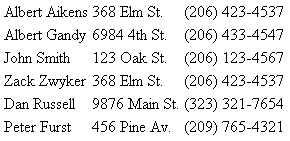Applies a template repeatedly—that is, to each node in a set.
<xsl:for-each select = Expression> </xsl:for-each>
| Number of occurrences | Unlimited |
| Parent elements | xsl:attribute, xsl:comment, xsl:copy, xsl:element, xsl:fallback, xsl:for-each, xsl:if, xsl:message, xsl:otherwise, xsl:param, xsl:processing-instruction, xsl:template, xsl:variable, xsl:when, xsl:with-param, output elements |
| Child elements | xsl:apply-imports, xsl:apply-templates, xsl:attribute, xsl:call-template, xsl:choose, xsl:comment, xsl:copy, xsl:copy-of, xsl:element, xsl:fallback, xsl:for-each, xsl:if, xsl:message, xsl:number, xsl:processing-instruction, xsl:sort, xsl:text, xsl:value-of, xsl:variable |
The <xsl:for-each> element establishes the context for iteration. The XSLT transformation instructions within this loop are to be applied to the selected nodes. Each source element selected by <xsl:for-each> becomes a new context against which any pattern matching within the <xsl:for-each> occurs.
The XSLT file in this example defines the structure of an output document. The output is a top-level HTML element containing <BODY> and <TABLE> elements. The table contains repeated rows for each customer. The XSLT file also uses templates to create <TD> elements for the name, address, and phone source elements.
Note To test this example, you need to use a script. For more information, see Initiate XSLT in a Script.
XML File (customers.xml)
<?xml version="1.0"?>
<?xml-stylesheet type="text/xsl" href="foreach.xsl" ?>
<customers>
<customer>
<name>John Smith</name>
<address>123 Oak St.</address>
<state>WA</state>
<phone>(206) 123-4567</phone>
</customer>
<customer>
<name>Zack Zwyker</name>
<address>368 Elm St.</address>
<state>WA</state>
<phone>(206) 423-4537</phone>
</customer>
<customer>
<name>Albert Aikens</name>
<address>368 Elm St.</address>
<state>WA</state>
<phone>(206) 423-4537</phone>
</customer>
<customer>
<name>Albert Gandy</name>
<address>6984 4th St.</address>
<state>WA</state>
<phone>(206) 433-4547</phone>
</customer>
<customer>
<name>Peter Furst</name>
<address>456 Pine Av.</address>
<state>CA</state>
<phone>(209) 765-4321</phone>
</customer>
<customer>
<name>Dan Russell</name>
<address>9876 Main St.</address>
<state>PA</state>
<phone>(323) 321-7654</phone>
</customer>
</customers>
XSLT File (foreach.xsl)
<?xml version="1.0"?>
<xsl:stylesheet version="1.0"
xmlns:xsl="http://www.w3.org/1999/XSL/Transform" >
<xsl:template match="/">
<HTML>
<BODY>
<TABLE>
<xsl:for-each select="customers/customer">
<xsl:sort select="state" order="descending"/>
<xsl:sort select="name"/>
<TR>
<TD><xsl:value-of select="name" /></TD>
<TD><xsl:value-of select="address" /></TD>
<TD><xsl:value-of select="phone" /></TD>
</TR>
</xsl:for-each>
</TABLE>
</BODY>
</HTML>
</xsl:template>
</xsl:stylesheet>
Output
This is the formatted output:

This is the processor output:
<HTML> <BODY> <TABLE> <TR> <TD>Albert Aikens</TD> <TD>368 Elm St.</TD> <TD>(206) 423-4537</TD> </TR> <TR> <TD>Albert Gandy</TD> ... </TR> </TABLE> </BODY> </HTML>
Creating and Populating an HTML Template